How Gold FM’s Christian O’Connell became the king of morning radio
Christian O’Connell thought all Melburnians loved Brits when he arrived at Gold FM. Then the first text arrived.
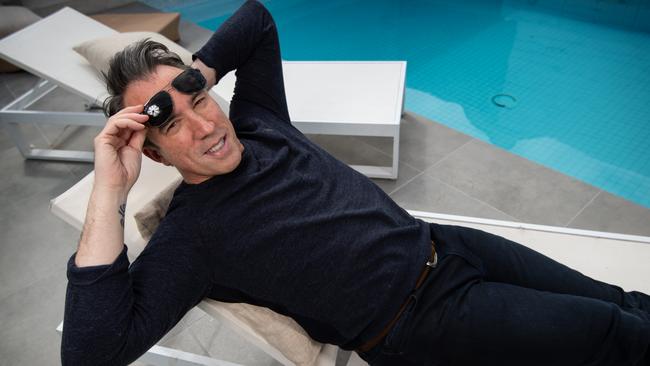
Lifestyle
Don't miss out on the headlines from Lifestyle. Followed categories will be added to My News.
The last thing you would expect from an interview with a top rating morning breakfast host is to find them, and yourself, in tears. Maybe tears of laughter, but a spontaneous eruption of raw emotion? Definitely not.
But that’s where we found ourselves with Gold FM’s Christian O’Connell and his wife Sarah, sitting at the timber kitchen table in their bayside home surrounded by their three dogs and friendly cat, Larry.
There were plenty of laughs and incredibly honest insights, too, on his journey from unknown UK radio ring-in, to the top-rating Melbourne FM breakfast host that has managed to defy the odds to topple established local favourites including Eddie McGuire and Luke Darcy on Triple M, Fifi, Fev and Byron on Fox and Nova’s Chrissie, Sam and Browny.
But it was his willingness to open up and share his vulnerability that exposed all of our emotions and what is surely the secret ingredient to his unexpected success.
It’s indicative of the power of real story telling and the reason why O’Connell has finally cemented his place at the top of the competitive radio market after failing dismally in the first year of his time at Gold FM.
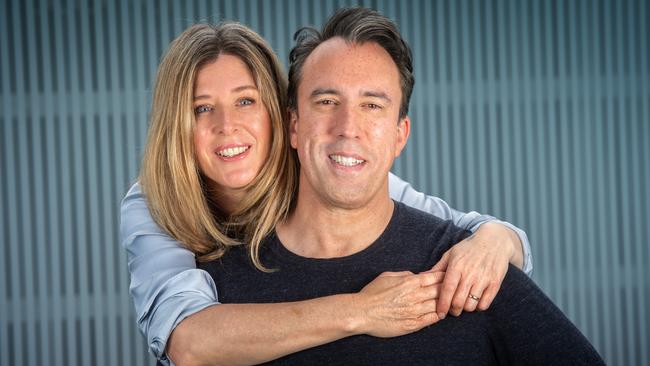
“Most male hosts are alpha male, very strong. I thought there was a gap to be different and I’m obsessed with real. I always think that the most interesting stuff and funny stuff, same with stand-up comedy, is in the ordinary, that to me is the best,” O’Connell says.
A much-loved radio star in the UK with a regular audience of 2.5 million listeners, O’Connell, 47, decided to throw it all in after 12 years at one of the top-rating national breakfast shows for new challenges in a market that had never heard of him.
He stops short at calling it a midlife crisis but admits now looking back “it was a waking up, I was ready for a new challenge”.
“I was starting to lose my mojo to be really honest and actually started to get quite down and depressed. You’re at that middle age, 40-something part of your life, where you start to think ‘Well is this it now? Has all the exciting stuff happened?’,” he says.
“At the time it was very frightening, I didn’t know what was happening. And I wasn’t enjoying doing the show.”
An ingrained sense of adventure, a love of Australia from several holidays here, and a friendship with Hamish Blake and Andy Lee, led him to consider a move Down Under.
“Sarah and I both have always loved Australia, and I got to know Hamish and Andy about six or seven years before. They’d always said come to Melbourne, come to Australia. So I rang Andy one day, I said, ‘Look, I’m seriously thinking about it, but surely my accent would be a problem?’. Andy’s a very positive man and he went ‘No one does the kind of radio you do, but it’s going to be slightly challenging’,” O’Connell says.
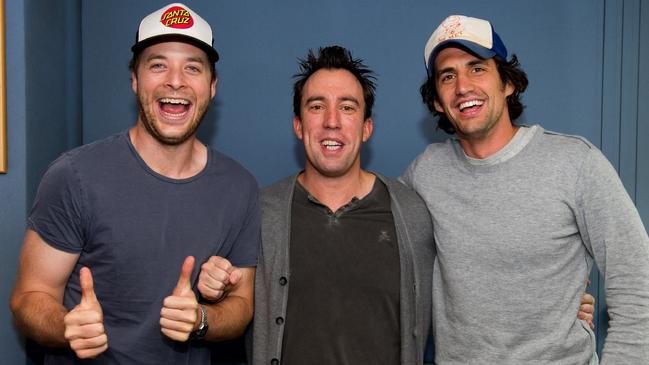
“I should have hung up at that moment, if I knew now hard it was going to be. Slightly challenging is nowhere near what it was like for the first year.”
The whole family, including daughters Ruby, 16, and Lois 14, sold up and relocated to Melbourne in 2018 full of excitement but unaware of the challenges that lay ahead.
“I’d gone from the adulation of two and a half million listeners that I’ve been talking to for 12 years, you’re a big part of their lives. And two weeks later, it actually felt like people hated you,” O’Connell says.
“I naively thought that everyone loved British people. The first text on the first show was ‘F--k off home’. The song ended 20 seconds later and I remember going “Good morning Melbourne”. But it was like that new teacher on the first day at school and their voice wobbles. You’ve got a team of six people who work with you and are looking at you like, ‘What are you going to do now? Come on. What have you got for us? You come from the foreign land, entertain us’.”
It was a substantial shock to O’Connell’s system and the vitriol continued for months after that first fateful show.
“Radio is all about intimacy, that’s what it’s built on, that’s why it still matters. And when you have a disconnect from that, like you’re not from around here, it is tribal,” he says.
“No one is at their best in the morning, most of the time you’re tired, you’re reactionary, you’re scratchy, most people are going into a job they don’t really like. The last thing they want is some grit in the morning of a British guy.
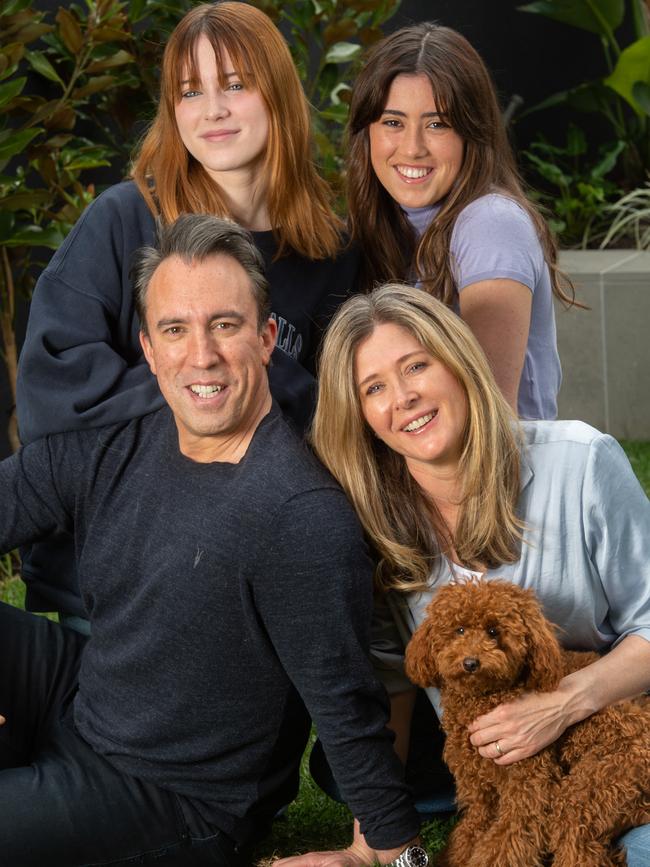
“I was British and uninvited, and I started to really question it. I was thinking, ‘I’ve moved the kids here at a really tough age. It’s all on me.’ In the UK, if it didn’t work I was always offered other radio shows because you’ve built up an audience and they come with you. I don’t have that here, so I knew if I got sacked in Australian radio, it is brutal. If I got sacked, which was a realistic option, then we’d have to move (back) to the UK with my tail between my legs, and it was like humiliation, embarrassment and also just getting it wrong for your family.”
Settling into a new life, halfway around the world from extended family and friends, proved to be harder than expected for all of them.
The teenage years can be trying enough but O’Connell and his wife both carried guilt over uprooting their girls who had to resettle into new schools and a new way of life.
“There was a time, we were so optimistic. Christian probably kept more of his fears to himself, but we were so optimistic that I think we weren’t prepared enough for some of the harder things,” Sarah says.
“I think that if you’d moved over here and you’ve got five and three-year-olds or you’ve got six and seven-year-olds you can organise the play dates, you can do all that kind of social networking for them, but when they’re teenagers, you’re relying on them doing it themselves and actually what we found was that was hard.
“It took them a while, it was a roller coaster. And it still is a roller coaster, being a teenager, there’s so many ups and downs, it’s just that we’re now doing our ups and downs in Australia.”
O’Connell, too, keenly felt the dislocation, admitting that at times in the early days he battled with loneliness.
“With middle aged men it’s really hard to make new friends because you haven’t got a lot of time to see your actual friends, and some British guy who probably isn’t going be around a long time anyways and get fired, there’s no point getting to know him because he’s not likely to be here in a years time,” he says.
“I was really lonely, you haven’t got anyone to go for a beer with on a Friday night. I remember at one low point, we both got to know this hairdresser, and he sent me a text saying, ‘Hey, I’m going out with my mates for a beer do you want to join us?’.”
“I was like yes, a break through, I’d love to. Second beer in I say to him ‘Hey listen, thanks so much for inviting me’. He goes, ‘Your wife said you’re really lonely’. I remember just going to the toilet and I rang Sarah and said ‘Why did you tell him I had no friends?’, and she said ‘Well it was true’.”
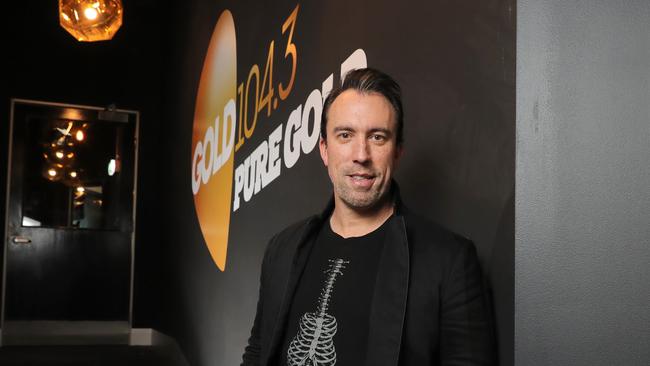
Slowly but surely O’Connell’s brand of radio, mixing the heartfelt with the humour, started to pay off. But he credits one moment more than any others for the turn around, and this is when the tears started to flow.
“I got an email from a guy called Peter Logan, and he said I listen to the show and I’ve got stage four terminal bowel cancer. Could you just use my story to tell people to do the test? And so I rang him, and said, ‘Look, why don’t you come on the show and you tell them?’, and he goes ‘No I don’t want to be on the radio. I don’t know if we want to hear about cancer in the morning’.
“I said the thing about cancer, we don’t really want to talk about it, it stays in the shadows and actually is a shadow. No one wants to hear about it any time of the day, but I think this is a really important message, you might save somebody’s life.”
O’Connell says the team debated behind the scenes on whether it was appropriate for the show, but eventually he decided it was something they had to do.
“I thought, ‘I’m gonna take the risk’ and so Peter came in. He’d always wanted to have a go at radio so we actually gave him an hour of the show, and made all the jingles ‘The Peter Logan Show with Christian O’Connell”.
“They came in, his family, and he spoke so well about it. And over the next six weeks the amount of tests that were being returned, that people had for a year or two stuck at the back of a drawer, went up something like 600 per cent, and people were writing on them, ‘Peter sent me’,” he says through tears.
“I was fine through all of it and then I was saying ‘Well thank you Peter’ and he was out there cuddling his daughters and when I saw that I was like, ‘Oh my God’. And I remember being so embarrassed that I’d cried on air. I felt shamed. I remember creeping out the door down the fire escape to go home.”
“But that for me, it changed everything. Putting him on, it was never about entertainment. I think they realised that actually there’s definitely something different about this guy. It wasn’t for ratings, it was because I thought it was the right thing to do and it might save a life. When I look back now, that changed everything between me and the listeners.”
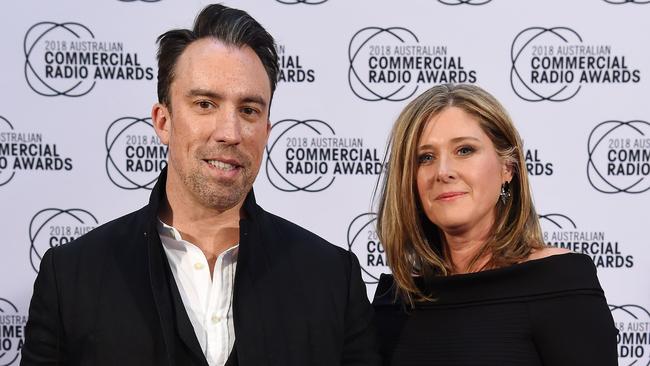
When the show made number one for the first time a year ago, O’Connell says he felt nothing but pure relief.
“I almost threw up with just the utter relief of, it’s not going be a question mark anymore now. Is it working? Am I working here now? And also enormous gratitude that the people had given me a chance. It just meant relief and it also meant we can really think that this is home now,” he says.
“We’d been here over a year and a half and we were actually starting to really enjoy life, we bought a house here and it was ‘I really hope this does work out because I’m really enjoying what we have here, all of it, not just the radio show but our life here and our opportunities here’.”
O’Connell says he’s learnt more in radio over the last six months than any other time in his 22 year career. When other shows took advantage of extended no-ratings periods, O’Connell’s team doubled down and worked even harder.
“Suddenly ratings got suspended and I remember getting my team together and saying, the instinct will be for other shows to take it easy now because there’s no ratings, we have to work harder because we really matter now,” he says.
“The last six months has been my biggest learning curve, about what actually matters to people, and that, even though it has been very hard, I’ll always look back on as an amazing time to be in radio.”
Peter Logan died earlier this year at the age of 54, but his legacy lives on for O’Connell.
“Keep up the humour and never forget the human! Love ya Mate!” were his final words to the radio presenter in a heartfelt email.
“That last line, ‘Keep up the humour and never forget the human!’ is written in my notebook so I see it everyday,” O’Connell says.




